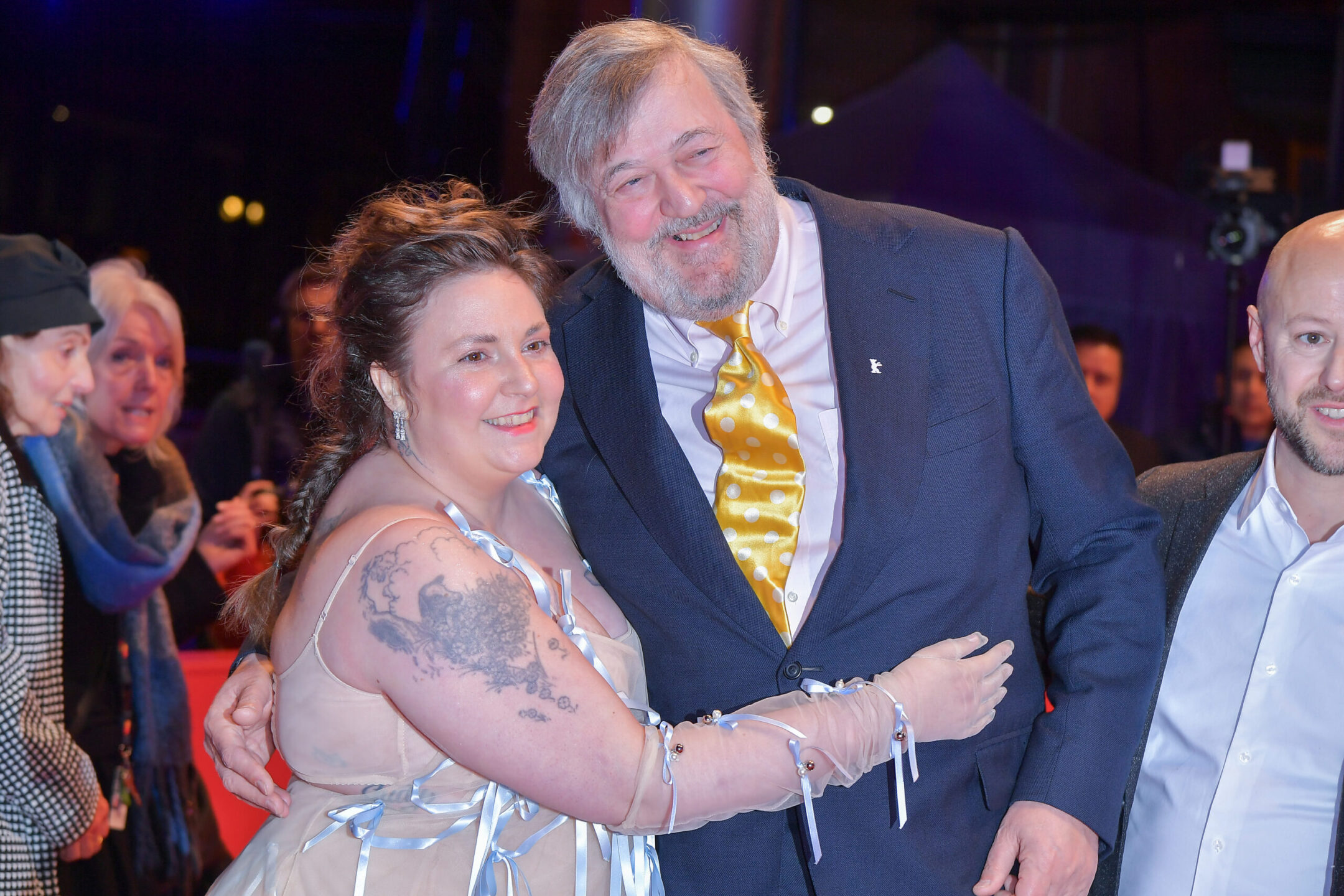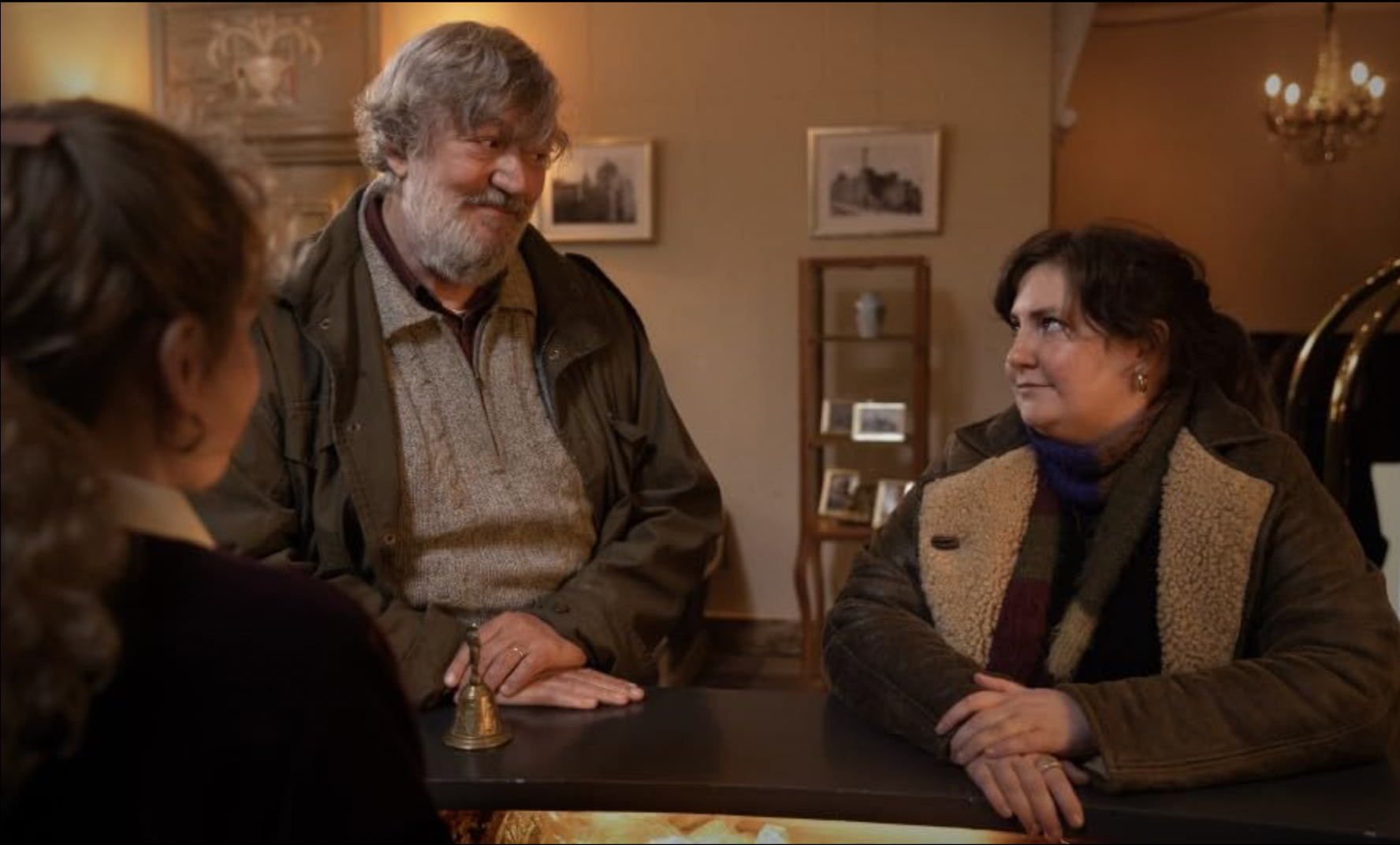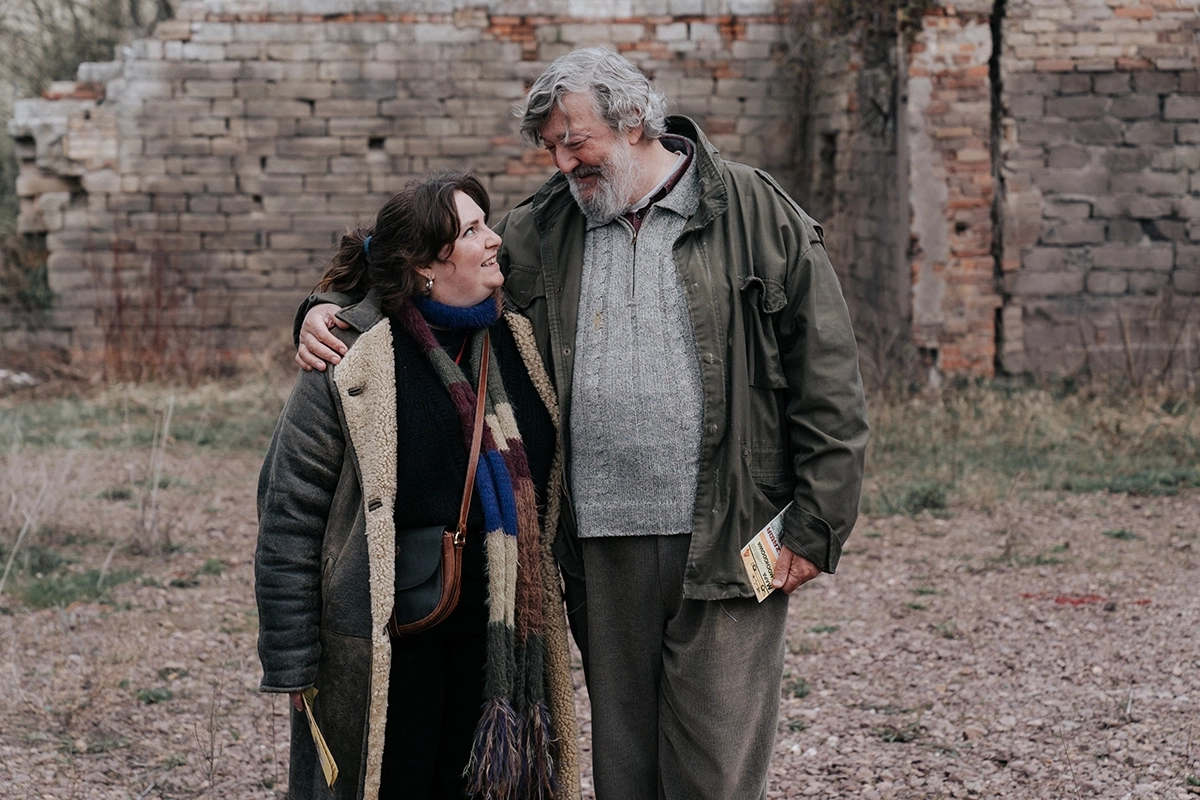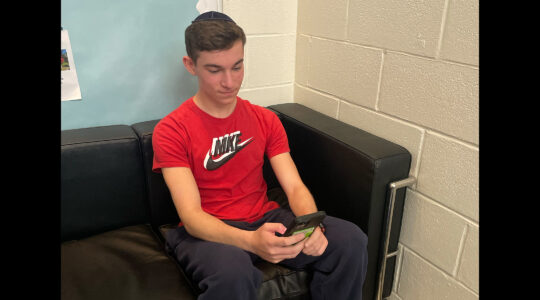BERLIN — On the day they filmed at Auschwitz, Lena Dunham and Stephen Fry weren’t allowed to say anything to each other except their scripted lines.
Fry had come down with Covid, and Julia Von Heinz, their director in “Treasure,” had only barely eked out permission from the memorial to film outside the Nazi concentration camp’s gates. Changing the dates, she was told, was impossible.
So the show went on, but with strict rules about conversation aimed at preventing Fry from infecting Dunham and further derailing production.
It was, Dunham said, excruciatingly difficult. The co-stars usually talked “from the minute we got in the hair and makeup chair in the morning until the minute that we got to our cars at night,” she recalled during an appearance at the Berlin film festival where “Treasure” premiered in February.
“I kept having to remind myself, because I wanted to connect with him on what we were seeing,” she added. “But Julia so wisely understood that his character was isolated in that feeling. And my character didn’t understand that feeling.”
The illness-induced separation between the on-screen odd couple — Dunham, the American actor, writer and producer known for giving voice to the angst of millennials, and Fry, a charming yet staid Brit nearly twice her age — mimicked the emotional gap between their characters, a father and daughter who take a roots trip to Poland in 1990, just after the fall of the Iron Curtain.
Based on the 2000 novel “Too Many Men” by Australian writer Lilly Brett, the film tells the story of New York journalist Ruth Rothwax (Dunham) and her Holocaust survivor father, Edek (Fry) as they visit the city of his birth — Łódź — and the Auschwitz-Birkenau concentration camp, which he survived. Their trip, which follows the death of Edek’s wife and Ruth’s mother, is both a passage into a world of memories and a test of each other’s boundaries.
The story of “Treasure” will be familiar to many Ashkenazi Jews who have either made such journeys, delved into genealogical research, or seen the 2005 movie “Everything is Illuminated” – based on Jonathan Safran Foer’s surreal, eponymous 2002 road-trip novel about the search for Jewish roots in Ukraine.
But unlike that story, which also unwinds along bumpy, post-Soviet roads, “Treasure” does not dip into magical realism, despite pulling some major tricks — including getting a British actor to speak a Polish-accented American English (“It was a challenge, but it was an enchanting one,” Fry said), using decrepit locations in contemporary Germany to convey the grim architecture of 1990s Poland, and employing special effects to film some Auschwitz scenes (because filming inside the camp boundaries is not allowed).
Rather, von Heinz conveys realistic father-daughter tensions, painting a believable portrait of the survivor who has learned to go with the flow, and the neurotic “second-generation” daughter who eats as if she were just liberated herself, who is obsessed with antisemitism, and sees the past in the present everywhere she tosses and turns.
And von Heinz does it with humor – something she hardly dared try at first.
Normally, “Germans wouldn’t dare to mix humor into that. We just wouldn’t dare it. Rightly so,” said von Heinz, who has one Jewish grandfather. Speaking at a press conference after the Berlin premiere, she said she fell in love with Brett’s novel and when casting the movie “just felt I needed two actors who made me laugh.”

Lena Dunham and Stephen Fry from the movie “Treasure” attend a movie premiere during the 74th Berlinale International Film Festival Berlin, Feb. 17, 2024 in Berlin. (Dominique Charriau/WireImage via Getty Images)
Her film is a study in contradictions: The elderly survivor Rothwax is full of vim and vigor, while his anxious daughter avoids intimacy. Edek has an affair at their hotel and asks buttoned-up Ruth when she last had sex; Edek proudly tells others that she is a famous journalist while she rolls her eyes; he enjoys the local foods while she avoids them, instead snacking compulsively when no one is watching. Slowly, osmosis occurs: Ruth has her own (albeit safe) flirtation, and Edek finally breaks out of his happy-go-lucky safe space, taking his daughter to find a “treasure” hidden on property his family once owned.
The film was completed in early 2024, according to von Heinz, who said that after Hamas attacked Israel on Oct. 7, killing about 1,200 people in what was the deadliest day for Jews since the Holocaust, the team decided they needed to get it done in time for the Berlin festival.
“We feel it’s the very moment for this film,” she said after the premiere there. In part, it is an answer to “people who say “We cannot hear it any longer. Does there really have to be another film about this subject?’”
The answer is that “there can never be enough stories to be told about this. And I think we are giving it a new perspective.”
For both Dunham and Fry, the story had personal resonance. Each of them has a Jewish mother and grew up with family stories of the Holocaust.
The film is “not just about a massive, massive, massive act of violence, but the generational, intergenerational consequences of that,” Dunham said at the Berlin press conference. “And I think that it’s important to acknowledge that it’s very, very much about the history of antisemitism and the history of the Jewish experience.
“But it’s also a story about how a legacy of violence affects anybody. There are so many groups who carry trauma in this way,” said Dunham, who learned details about her family members’ Holocaust survival on a recent episode of PBS’ “Finding Your Roots.” “And hopefully an examination of trauma like this, looking backwards, can help us think about the legacy that we create moving forward.”

The father-daughter duo in “Treasure” tour Poland, including Auschwitz. (Bleecker Street)
Fry’s visit to Auschwitz was his first.
“Knowing that I had family who had perished in that place was a very extraordinary feeling,” he said. “The generation of survivors that I knew wanted me to grow up in a free society, free of antisemitism, free of that legacy. They thought the victory over the Holocaust, the victory over hatred, would be to be almost unaware of it.”
“They didn’t want the children to be burdened with the knowledge of what happened,” said Fry, who also probed his family’s story in his 2012 film “Wagner and Me.”
“But, of course, as time has passed, the message is slightly different: It’s that it’s too important to keep it alive and to remember,” added Fry, who spoke out against antisemitism in his annual Christmas video in December. “Because while history may not repeat itself, as somebody once put it, it rhymes. And there are similar feelings now, as we know, rising up.”
Dunham told JTA she prepared for her role by talking with author Lilly Brett. “It’s no secret that this is an autobiographical novel,” the actress said. “She very generously spent time with me on Zoom and shared aspects of her life that weren’t in the book. I just wanted to know things like, what was it like to grow up in your house? How did you relate to your mother? What made you crazy about your parents?”
She said the result was a movie that might be more relatable than had it only dwelled on trauma and conflict.
“What I love about this film is, yes, it’s about the absolute horrors of the Holocaust and things that we can never, ever forget,” Dunham said. “And it’s also about the kind of mundane and universal love inside of families.”
“The idea that you have a neurotic, modern American girl as the daughter who is fussing about her diet is such an important window into the difference between their experience and what they think of life, what they get out of life,” Fry told JTA. “It’s just a privilege to be inside a world that is so acutely realized, in which humor and sorrow are so closely next to each other, they leak into each other all the time.”
Dunham — producer and star of the hit HBO comedy series “Girls” — said she “was surprised that Julia thought of me for the movie” because it was a departure from her typical roles. She added, “Even if I now just go from that to playing total goofballs, it’s something I will cherish for the rest of my life.”
JTA has documented Jewish history in real-time for over a century. Keep our journalism strong by joining us in supporting independent, award-winning reporting.






